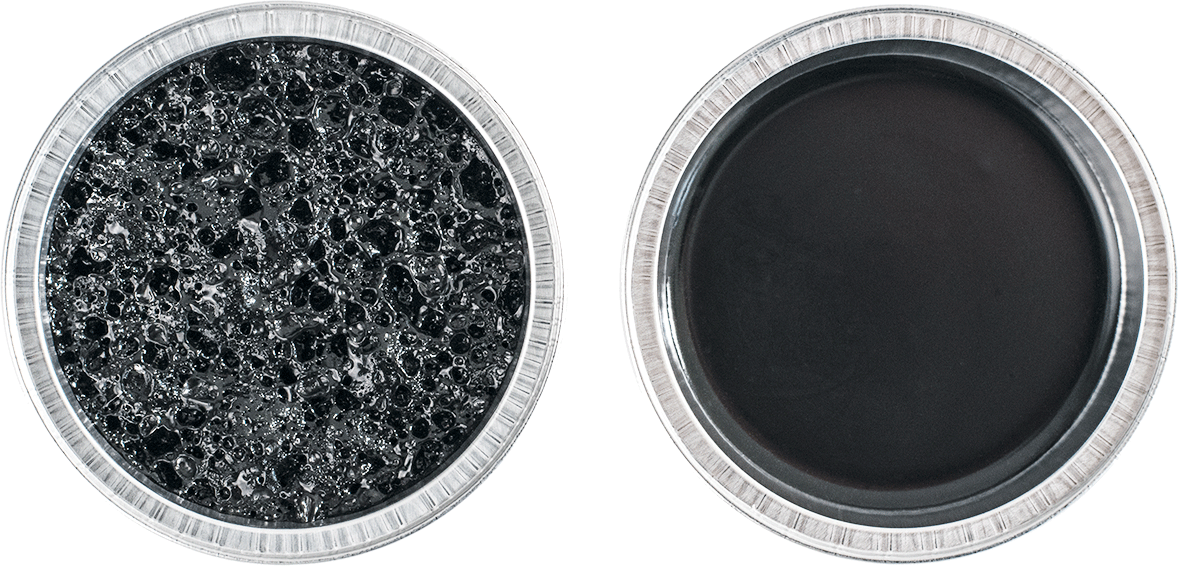Polyurethane: "customized plastic"
Polyurethanes have an extremely wide and flexibly modifiable range of properties. This makes them a popular and frequently used group of materials in industrial production. PU potting compounds can be processed easily and feature protective properties similar to silicones and epoxies. To prevent the material from foaming up, PU-based casting resins always have to be protected from moisture during processing.
Polyurethanes (PU) are extremely versatile and are therefore one of the most frequently used two-component materials in industry. PU is the result of the additive reaction of polyisocyanates with polyvalent alcohols known as poyols. Using suitable components and additives, the properties of polyurethanes can be varied much more than any other class of materials, depending on the requirement and application. This makes it possible to create "custom plastics", which have properties ranging from hard and brittle to pliable, from highly fluid to highly paste-like.
Polyurethanes: properties and areas of application
Polyurethanes are most frequently used in the form of foams for upholstery, household sponges and athletic shoes. They are also used in construction as 1K or 2K foaming adhesive. Casting resins based on polyurethane are often used in the manufacture of electronics, such as for potting capacitors, transformers and semiconductors. In this case they serve to insulate and protect the components from environmental influences such as moisture, corrosive media and mechanical stress. Polyurethane is also used in the electromobility industry in the form of thermally conductive gels or pastes for lithium-ion batteries.
Polyurethane potting compounds offer users a number of different options both with regard to the particular processing parameters and to their ultimate range of properties. The purchasing costs for PU casting resins are usually lower than for silicones or epoxy resins. Moreover, these materials can be processed well in machinery, shrink very little in volume, and offer a slight amount of movement after curing. The reaction in the case of PU potting compounds is also less exothermic than that of epoxy resins, for instance. They can therefore also be used for potting more sensitive electronic components. Since they are only heat proof up to a temperature of about 130°C, PU casting resins are less suitable for applications with high temperature requirements. Thanks to new formulations, however, it is possible to achieve good results up to 160°C. Depending on the formulation, polyurethane potting compounds can have high thermal expansion coefficients. This value indicates how much a material expands under the influence of temperature. For instance, elastic PU after potting is capable of compensating for different material expansions on a workpiece. For components with physically delicate structures, such as sensitive electronics, there is the risk that they will become damaged or destroyed by this material expansion. However, by introducing special additives, the thermal expansion coefficient of PU potting compounds can be effectively reduced.
For comparison
On the left you can see foamed PU.
On the right you can see correctly potted PU.

Polyurethanes: processing and potting
Polyurethane potting compounds are very sensitive to moisture, since the curing components react with water when influenced by temperature, causing the release of carbon dioxide. If the reaction occurs in a storage tank, highly corrosive polyurea crystals will form, which is the result of opening the container too often for material removal.
Since these storage methods would quickly render the PU unusable, it is important to avoid this common application error. If the reaction occurs with water as part of the curing reaction, the polyurea will be integrated in the network structure of the plastic and the material will foam up. To achieve superior potting results, proper storage of the material barrel is just as important as the preparation of the polyurethane in a vacuum. This allows even moisture-sensitive potting compounds to retain their quality and functional properties.
Scheugenpflug offers a range of material preparation units specifically designed for processing moisture-sensitive casting resins:
- The proven, versatile LiquiPrep LP804 can be used to prepare and feed the potting compound in a vacuum. In addition to particularly sensitive media, the A310 is also perfect for chemically inert casting resins.
LEARN MORE LiquiPrep LP804
- The barrel agitator station is used for applications requiring large amounts of material. This system works with a 200 liter barrel in a complete vacuum.
LEARN MORE ABOUT THE BARREL AGITATOR STATION
TIP: If the PU used is highly sensitive, existing surface moisture on the soon-to-be potted workpiece can cause bubbling. However, this can be prevented by using plasma pretreatment in combination with processing the material in a vacuum.

